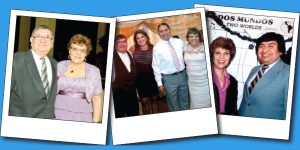
Treinta años — lo siento, Gardel — son muchos, particularmente cuando se pasan cubriendo noticias para la televisión.
Acabo de cumplir tres décadas como conductor del Noticiero Univision en Estados Unidos, y mi primer pensamiento es de agradecimiento. El único sentido que tiene trabajar como periodista en la televisión es que la gente crea lo que dices y que vea lo que haces. Sin esos dos requisitos, ninguna carrera aguanta.
Cuando me escogieron como “anchor” del noticiero el 3 de noviembre de 1986, tenía apenas 28 años de edad. Y me trepé, literalmente, a la ola latina. En esos años había sólo 15 millones de latinos; hoy somos más de 55 millones. Antes, casi nadie nos hacía caso; en estos días nadie puede ganar una elección sin nuestros votos. La televisión en español en Estados Unidos pasó de ser una curiosidad mediática a convertirse en líder de audiencia en ciudades como Los Ángeles, Miami, Chicago y Nueva York, entre muchas otras. Eso se llama surfear con la historia.
Me hubiera gustado quedarme a trabajar en México, el país donde nací. Pero no pude. El México de los años 80 estaba lleno de censura y represión. Calculé, correctamente, que tardaría mucho en llegar un cambio democrático. Eso me hizo un inmigrante. Llegué primero a Los Ángeles, y luego me asenté en Miami, donde nacieron mis hijos Nicolás y Paola. Ellos me enseñaron lo verdaderamente importante y la alegría de vivir siempre en el presente.
No escoges ser inmigrante; las circunstancias te obligan. Y dejarlo todo — casa, familia, amigos — te marca para siempre. Temo, por ejemplo, volver a perderlo todo de un momento a otro. Aprendí a convivir con la nostalgia, extrañando olores y sabores, y me he pasado media vida buscando mi casa. Al final, Estados Unidos me dio generosamente las oportunidades que México no pudo. Hoy vivo con los brazos estirados agarrando a mis dos países, saltando continuamente la frontera con dos pasaportes y votando en dos lugares.
Este maravilloso oficio del periodismo ha sido mi boleto al mundo. Ser reportero me salvó de los nacionalismos; el planeta es nuestra sala de redacción. Una aerolínea dice que he volado más de 2 millones de millas con ellos — sospecho que millones más con otras — y tengo una regla al empacar: Nunca checo equipaje, sólo llevo lo que va conmigo. Así me he ido de guerras y de turista. A pesar de todo, tengo una confesión: Todavía me da miedo volar.
Me siento más a gusto pisando tierra. Mis mejores lecciones periodísticas las aprendí haciendo calle. Así aprendí a contar las historias de los invisibles, de los que no tienen voz, y a hacerle preguntas incómodas a quienes tienen el poder. No puedo decir que ha sido fácil, pero duermo en paz todas las noches.
En la cadena Univision encontré a mi familia adoptiva. ¿Quién tiene la suerte de trabajar felizmente durante más de tres décadas en el mismo lugar? Mis compañeros de Univision, Fusion y yo sabemos que esta no es una ocupación para gente normal. Me he perdido muchos cumpleaños, aniversarios y fiestas. Pero a cambio he tenido muestras extraordinarias e irremplazables de cariño y solidaridad.
En estos 30 años he compartido el escritorio del Noticiero Univision con Teresa Rodríguez, Andrea Kutyas y María Elena Salinas. Es toda una vida. Lo sé. Pero sólo quiero que sepan que les agradezco su infinita paciencia. Gracias, de verdad, por aguantarme.
La televisión es el medio más artificial que existe. Por eso los que más éxito tienen en la TV son aquellos que pueden actuar con naturalidad frente a las cámaras. Sin embargo, quienes trabajamos en este medio a veces nos equivocamos y creemos que la televisión es lo más importante. No lo es. La vida real — esa que duele y se disfruta — no ocurre frente a una cámara. Y cuando eso se me olvida, repito mi mantra: “It’s only television.”
Escogí bien. Mi papá quería que fuera abogado, doctor, ingeniero o arquitecto como él. Cuando le conté que quería estudiar comunicación en la universidad, me dijo: “¿Y que vas a hacer con eso?” No sé, le contesté, pero no me quería pasar la vida haciendo algo que no me gustaba. Y así me lancé a esta aventura, admirando el trabajo de Elena Poniatowska y Oriana Fallaci.
Los actores pueden vivir muchas vidas a través de sus personajes. Los periodistas no. Solo tenemos una pero llena de intensidad. Hoy estoy seguro que no podría haber escogido una mejor manera de vivir estos últimos 30 años.
(Jorge Ramos, periodista ganador del Emmy, es el principal director de noticias de Univision Network. Ramos, nacido en México, es autor de nueve libros de grandes ventas, el más reciente de los cuales es “A Country for All: An Immigrant Manifesto”.)
(¿Tiene algún comentario o pregunta para Jorge Ramos? Envíe un correo electrónico a Jorge.Ramos@nytimes.com. Por favor incluya su nombre, ciudad y país.)
__________________________________________________________________________________________________________________
Reflections on 30 Years in TV
By Jorge Ramos
With apologies to Carlos Gardel, the famous Argentine singer, 30 years is not nothing. I’ve just celebrated three decades anchoring “Noticiero Univision,” the network’s nightly newscast, and my past few days have been filled with gratitude and reflection.
If these last 30 years have taught me anything, it’s that the most vital component of journalism is credibility. People have to tune in to you knowing that you will give them the truth. Without this trust, no journalistic career can last.
On Nov. 3, 1986, at the age of 28, I was tapped by Univision executives to be an anchor. It was certainly a different era. Back then, there were only 15 million Latinos living in the United States; now we number more than 55 million. Thirty years ago, few people were interested in what the Hispanic community had to say; today, politicians cannot win elections without our support. Since the 1980s, Spanish-language television has transformed itself from a media curiosity into a leader in ratings in cities like Los Angeles, Miami, Chicago and New York.
I would have liked to stay and work in Mexico, where I was born, but that wasn’t an option. Media censorship and repression were rampant in the 1980s, and I rightly estimated that a true democratic shift in Mexico would take too long to be realized. This calculation made me an immigrant. I arrived in Los Angeles first, and I eventually settled in Miami, where my children, Nicolás and Paola, were born. They’ve taught me about the things that really matter and about the joys of living in the present.
Nobody chooses to be an immigrant — circumstances force you to leave everything and everyone you know behind. And doing so leaves an everlasting mark. In my case, I still fear that I will lose everything in an instant, which is a common feeling among immigrants. I’ve also learned to coexist with my nostalgia for the scents, flavors and scenery of my former home. But the U.S. has offered me opportunities that Mexico couldn’t. These days I live with my arms outstretched, embracing both countries as I hop frequently between them, with two passports and the ability to vote in each.
Journalism, my wonderful trade, has been my ticket to the wider world. At Univision and Fusion, the planet is our newsroom. I’ve flown millions of miles during my career, and my one rule for packing hasn’t changed: I never check luggage. I only take what I can carry myself. That’s how I’ve traveled as both a war correspondent and a tourist. Nonetheless, I have one confession to make: I’m afraid of flying. I simply feel more comfortable on the ground.
I’ve learned my best lessons about journalism while reporting from the street. That’s where I’ve been able to gather the stories of the voiceless members of society, and where I’ve learned to pose tough questions to those in power. I can’t say it’s been easy, but I sleep peacefully every night.
At Univision, I found an adoptive family. My co-workers realize that journalism is not a career for normal people. Over the years, I’ve missed birthdays, anniversaries and family parties. In return, my co-workers have shown me extraordinary kindness and demonstrated never-ending solidarity. Over these 30 years, I’ve shared the anchor desk at Univision with Teresa Rodriguez, Andrea Kutyas and Maria Elena Salinas. I want them to know how grateful I am for their infinite patience — truly, thanks is in order for putting up with me.
I’ve learned how incredibly artificial television can be, which is why the most successful people in the industry are those who can act most naturally in front of the cameras. It’s sometimes easy for people to flip their priorities and consider producing TV to be more important than real life. It’s not. Real life doesn’t happen in front of a camera. When I forget that fact, I have to recall my mantra: “It’s only television!”
I know that I chose the right career. My father wanted me to become a lawyer, a doctor or an engineer — if not an architect like him. When I confessed that I wanted to study communication in college, he asked: “What are you going to do with that?” I don’t know, I replied. What I did know was that I didn’t want to spend my life doing something that I didn’t love. And that’s how I launched myself into this journey, being inspired by the work of journalists like Elena Poniatowska and Oriana Fallaci, among others.
I’ve learned that while actors can live several lives through their characters, journalists cannot. We only have one life, but it’s full of excitement. Today I’m sure that I couldn’t have chosen a better way to spend the last 30 years.
(Jorge Ramos, an Emmy Award-winning journalist, is a news anchor on Univision and the host of “America With Jorge Ramos” on Fusion. Originally from Mexico and now based in Florida, Ramos is the author of several best-selling books. His latest is “Take a Stand: Lessons From Rebels.” Email him at jorge.ramos@nytimes.com.)










